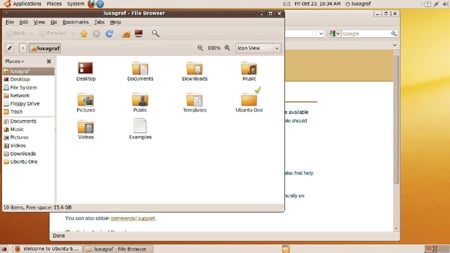Ubuntu 9.10 - aka Karmic Koala - is taking the fight to Microsoft and its new Windows 7 operating system.
The Koala - due for its official release today - brings faster boot times, a revamped software installer, better disk encryption, online services, and quite a bit more to the popular Linux desktop.
We took the release candidate for a spin and are happy to report that while work remains, Ubuntu 9.10 has plenty of improvements and that it's well worth upgrading your current system.
For long-time Ubuntu fans, the most immediately noticeable change in Karmic Koala will likely be the new Software Center, the graphical utility for package management which replaces the traditional GNOME Add/Remove tool.
As it stands with the 9.10 release Software Center doesn't really do anything Add/Remove didn't, but the interface is considerably cleaner and will likely be easier for Linux newbies to navigate.
More interesting is where Canonical plans to go with Software Center in future releases. The goal is to eventually replace Synaptic, gdebi, some parts of the Computer Janitor, and possibly the Update Manager as well, with the all-in-one Software Center. Ubuntu also plans to offer commercial software through Software Center, though that won't likely happen until version 3.0 - currently Software Center is a 1.0 release.

While Software Center looks great as is, and Canonical's plans call for an even brighter future, at the moment Software Center is essentially a prettier version of the familiar old Add/Remove.
Another bright spot in Karmic Koala is significantly faster boot times. This is an issue that goes beyond Ubuntu, with Microsoft making much of the improvements in Windows to make its latest operating system - Widows 7 - start faster than Windows Vista.
Ubuntu founder Mark Shuttleworth has been looking forward to a scrap with Windows 7 on netbooks and, earlier this year, his company Canonical announced plans to optimize Ubuntu's boot performance. The goal being to get the system up and running much faster.
Unfortunately, you won't get to enjoy the fruits in Karmic Koala, but the eventual goal is to deliver 10-second startups by the time Ubuntu 10.04 is released in 2010.
The boot time tests for the final release of Ubuntu 9.10 mirrored our earlier experience with the beta release - the average startup time was 26 seconds, with the Xorg starting around the 15-second mark.
The times are a little disappointing given that the eventual goal is ten seconds. But of course it's worth asking how often the average user actually boots up Ubuntu. Given its stability, most Linux users tend to just leave the system running indefinitely, making the faster boot time of dubious benefit.
Perhaps the most common use case for faster boot times are netbooks, where Solid-State hard drives are becoming increasingly common. Netbooks are an area Microsoft hopes Windows 7 will do well, compared to Windows Vista. Given that SSDs boot faster anyway, coupling them with Ubuntu's boot optimizations will likely make for some very fast boot times.
Encryption included
Under the hood of Ubuntu 9.10 there are some nice improvements including GRUB2, which is now the default bootloader, along with an improved AppArmor and disk encryption utilities.
Ubuntu has included the AppArmor enhanced access control framework ever since the 7.10 release. However, Ubuntu has never surfaced or promoted AppArmor as much as other distros like Fedora. That continues with Karmic Koala where, for example, there's a new Firefox sandbox policy, but it's disabled by default.
Still, AppArmor does get some love in Karmic Koala with new support for cache files. AppArmor gives you more access control to grant or deny system privileges on a much more granular level than is possible with Linux's default access scheme. The new cache element means that AppArmor is a bit faster to initialize on boot.
Also on the security front is a much improved disk encryption tool. Ubuntu has had block-level encryption for some time, but did not include the option on the LiveCD. More granular encryption arrived in Ubuntu 9.04, which allowed users to encrypt their entire home directory, but the option still wasn't part of the LiveCD installer.
However, this time around, the Ubuntu LiveCD installer will offer the option to encrypt your home directory - also configuring the swap partition for encryption.
BittLocker minus the up-sell
The entire hard drive encryption tools are still available via the alternate installer, but for most users interested in protecting their laptops should they fall into unknown hands, the LiveCD's home directory option should provide ample protection and still allows the automatic login feature to work.
For its part, Microsoft has been pushing file and hard drive encryption in Windows 7 - the latter with BitLocker. However, encryption comes at a price with Microsoft: BitLocker is only available in the most expensive version of Windows 7 available to consumers and individuals, Windows 7 Ultimate priced $219.99 for an upgrade and $319.99 new.
In another notable parallel with Windows 7, Ubuntu 9.10 comes with features that aren't actually a part of the operating system. Yes, we're talking about the Ubuntu One cloud storage tools that come baked in with the latest release.
For Windows 7, various pieces are excluded from the installation media but are downloadable as a Windows Live package. These include Live Call, Live Messenger and Live Drive - Microsoft's online data storage and file sharing service with up to 25GB of free storage.
When it comes to the Ubuntu One client software you'll find in the Karmic Koala you get a simple way to backup, sync and share files over the web. Ubuntu One offers 2GB of storage for free, with a 50GB option available for the price of 10 per month. Ubuntu One also offers public shared folders, which other Ubuntu users can access from their desktop. Anyone not using Ubuntu can still access the files through their browser.

Similar in both price and usage to other cloud backup and sync solutions (like Dropbox), Ubuntu One lets you designate the files and folders you'd like to backup or sync between Ubuntu installs. Previously, using Ubuntu One required enabling the universal repositories, and installing the client software.
Sadly, in our limited testing the Ubuntu One site continually timed out and threw proxy errors so we never able to login and sync our files. If nothing else, we take that as a sign that the service is popular with Ubuntu users.
Since the Ubuntu 9.10 beta was released, Canonical has expanded Ubuntu One from simple file synchronization to backup of some application data. For example, Tomboy notes created in Ubuntu 9.10 can be synced through Ubuntu One as well as contacts pulled from Evolution.
In a further nod to online services, Ubuntu 9.10 is available for download in both ISO format - directly and via Bittorrent. The new twist, though, is that for the first time the Linux distro is also available as a Cloud image format for use with Ubuntu Enterprise Cloud and Amazon's EC2.
Filesystem first
In other changes, Karmic Koala is the first Ubuntu release to use the ext4 filesystem by default. Savvy users might already have made the leap to ext4 with 9.04, which included support for ext4, though stopped short of making it the default option.
Karmic Koala sees ext4 making its prime time debut and it brings some speed improvements along with it, especially in areas that involve a lot of disk writing like moving and copying large files.
There is one downside, though: you can't always mount an ext4 file system using ext3, so if you frequently access your Ubuntu system by mounting it in ext3 environments you may experience some problems.
On the application front, not a lot has changed in Ubuntu 9.10. The Pidgin messaging client has finally been replaced with Empathy, something other GNOME distros have also done. Empathy isn't just a new Instant Messaging client though, it brings with it a whole new framework known as Telepathy. More than just a Pidgin replacement, Telepathy offers baked in video-chat and VOIP support, two things that aren't even on the Pidgin roadmap.
However, Pidgin has legions of loyal users who may be less than thrilled about Empathy. While the two look similar, Pidgin has quite a few more bells and whistles. Fortunately for those that want no part of Empathy, a quick trip to the new Software Center is all it takes to get Pidgin back on your desktop.
Overall, then: Ubuntu 9.10 is a very stable and despite a few quirks - like needing to enable AppArmor settings by hand - a worthy successor to Ubuntu 9.04. ®
Reference : http://www.theregister.co.uk/2009/10/29/ubuntu_9_10_review/
No comments:
Post a Comment